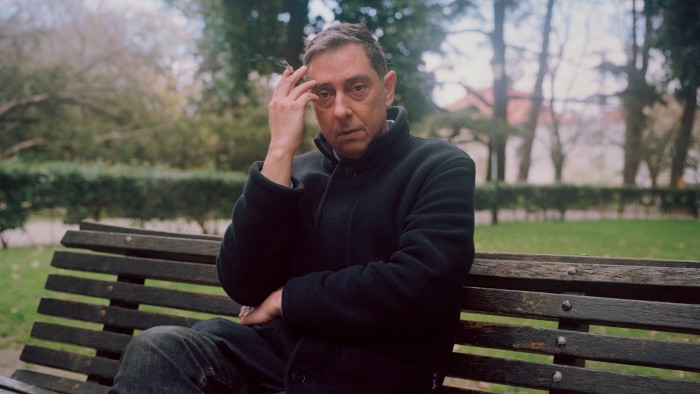Summarize this content to 2000 words in 6 paragraphs in Arabic Experimental art films from Portugal are not usually inspired by anything as quintessentially English as the writing of W Somerset Maugham — nor would you expect their soundtracks to feature the “Eton Boating Song”. But then Grand Tour is an extravagantly playful culture-clash exercise, and Portuguese writer-director Miguel Gomes a notoriously mischievous scrambler of conventional cinematic forms. Known for his distinctive mixes of fiction and documentary, deadpan melancholy and offbeat comedy, Gomes specialises in leading viewers on unpredictable journeys — in his new film Grand Tour, quite literally.Its narrative involves a young British couple in south-east Asia in 1918: diplomat Edward (Gonçalo Waddington), who runs away on the eve of his wedding; and his fiancée Molly (Crista Alfaiate), who tenaciously pursues him from country to country. Made in black and white, in a spot-on pastiche of 1930s Hollywood productions, this strand of Grand Tour — shot on studio sets — first shows the ever more jaded Edward on a long picaresque voyage from Mandalay to Shanghai, then follows Molly on the same route, exuberant, wide-eyed and avid for new experience. Intercut with all this is contemporary documentary footage that Gomes shot on that same itinerary, before the film’s script was written.The idea was inspired by Gomes reading Somerset Maugham’s 1930 travel book The Gentleman in the Parlour and coming across a comment about men being cowards, women stubborn when it comes to marriage — just as he was about to marry his frequent collaborator, filmmaker Maureen Fazendeiro. The couple embarked on their own Asian odyssey, with their co-writers and a skeleton crew, then wove a story around the footage. As Gomes, 53, explains over Zoom, “It’s a chase — there’s this guy running away from this woman, but there’s also the viewer trying to chase what we shot and to put it together with the studio images. Everyone is chasing something in the film.”It was a complicated shoot, or rather shoots. Gomes, Fazendeiro and party began their journey in Myanmar, worked their way east, and were about to enter China early in 2020 when the Covid pandemic began and they had to return home; Gomes later directed a Chinese crew remotely from Lisbon. Later still, the adventures of Edward and Molly were filmed on sound stages in Lisbon and Rome, in recreations of settings including a bamboo forest, a royal palace in Bangkok and the lounge of Raffles Hotel in Singapore, complete with its famous ceiling fans. The result is an elegant, atmospheric evocation of classic Hollywood cinema, redolent of the orientalist romances once made by Josef von Sternberg (Shanghai Express, The Shanghai Gesture). But there is also a hefty dose of the heady whimsy of the same period’s screwball comedy, with Howard Hawks’s Bringing Up Baby as a particular model.Scripted by Gomes, Fazendeiro and two other writers (billed as the “Central Committee”), Grand Tour may strike some as an elaborate hipster sightseeing jaunt; in fact, the film very much challenges the western history of travel cinema. The traditional colonial viewpoint — associated equally with Portuguese and British culture — is undermined by voiceover narration in multiple Asian languages, plus ample dialogue that pointedly remains untitled.How did the film’s team themselves avoid being simply tourists on their journey? Taking pensive slugs from a lunchtime glass of red wine, Gomes says, “I think we were tourists in the traditional sense. The question is whether to be a good tourist or a bad one. We knew it would be impossible to pretend that we were insiders. One of the objectives of this trip was to go somewhere far from our daily lives, and try to catch something that would be interesting in different ways — funny or touching, beautiful, graceful. To get back some of the sensation of wonder.“We know too much, we have seen too many films, we travel to every place in the world. It’s difficult to get back some kind of innocence, the capacity to be amazed.”The amazement in Grand Tour comes partly from the pastiche element and the stylised performances. “I encouraged the actors to avoid being naturalistic, and to have as much fun as Katharine Hepburn when she was making those kinds of films,” Gomes says. He spent an entire day with actress Crista Alfaiate to find the perfect laugh for Molly: she eventually came up with a raucous, filthy-sounding raspberry. Then there is the interweaving of the drama sequences and the contemporary reality of the documentary footage, whether spectacular (puppet shows, a giant Buddha statue, pandas and macaques in the wild) or the everyday (Saigon’s massed motorbikes, a man tearfully singing “My Way” in a Manila bar). People encountered en route sometimes contributed to the story in unlikely ways, such as a Vietnamese fortune-teller whom Fazendeiro consulted in the guise of Molly. “Maureen gave her a fake birth date and pretended she wasn’t married, and from the start the fortune-teller was suspicious — she was a good one.” Even so, her predictions about Molly’s fate found their way into the narrative.The shoot used local crews everywhere it went — one constant being Thai cinematographer Sayombhu Mukdeeprom, who recently shot Luca Guadagnino’s Queer (the studio footage in Grand Tour was filmed by another Gomes regular, Rui Poças). The end credits give only sparse details for the Myanmar crew, noting that they can no longer be contacted because of the military coup of 2021. “Myanmar today,” Gomes says, “is a scandalous political issue that no one talks about.”When their own tour was interrupted, Gomes and Fazendeiro took time out to co-direct a lockdown film, The Tsugua Diaries — a chamber piece played backwards over a single month (“Tsugua” being August in reverse). Gomes generally devises his films along unusual formal lines. Our Beloved Month of August (2008) starts as a documentary about amateur dance bands, then turns its real-life participants into fictional characters in a rural melodrama. Tabu (2012), ostensibly set in contemporary Lisbon, suddenly jumps back to Portuguese colonial Africa in the 1960s, to recount a love story haunted by a “sad and melancholy crocodile”.Then there is the altogether sui generis three-film project The Arabian Nights (2015), made as a response to Portugal’s economic crisis: “It just happened, so let’s try to do something with this, the quickest way possible — almost like doing fiction live.” It was made in collaboration with a team of journalists gleaning stories from across the country; the resulting dramatic and documentary episodes are interspersed with sequences inspired by the One Thousand and One Nights, larkily staged like an avant-garde am-dram production of Aladdin. Gomes himself is seen at the start running from his crew in panic at embarking on such an ambitious project. He favours these self-reflexive touches: “It’s a way to implicate the viewer. The viewer is not just following the plot, but is also watching the birth of the film. You become part of it.”Gomes grew up in Lisbon and realised how much he loved cinema around the age of 10, when he got into a fight during Dumbo because other children were laughing at the elephant’s woes. He graduated from that to Raiders of the Lost Ark, then to the French New Wave in his teens. The decisive spark that made him go to film school was a now rather forgotten gem of Portuguese cinema, Recollections of the Yellow House (1989), by the profoundly eccentric actor-director João Cesar Monteiro. “This is cinema,” Gomes remembers thinking. “It’s a portrait of Lisbon, it doesn’t look like anything I know, and it’s amazing.”The director, who also served for several years as a film critic on the newspaper Público, has sometimes claimed that all his films are essentially remakes of The Wizard of Oz. That classic, he explains, contains two possibilities of cinema, the real and the imaginary. “Dorothy lives in the countryside in Kansas: she’s bored with her daily life and she dreams about another place — and that place is cinema in Technicolor. In a way, every film I’ve made deals with this kind of feeling — let’s see what Kansas can bring to Oz and what Oz can change in Kansas.”‘Grand Tour’ is on Mubi now
رائح الآن
rewrite this title in Arabic Miguel Gomes on reinventing travel cinema: ‘The question is whether to be a good tourist or a bad one’
مال واعمال
مواضيع رائجة
النشرة البريدية
اشترك للحصول على اخر الأخبار لحظة بلحظة الى بريدك الإلكتروني.
© 2026 جلوب تايم لاين. جميع الحقوق محفوظة.










